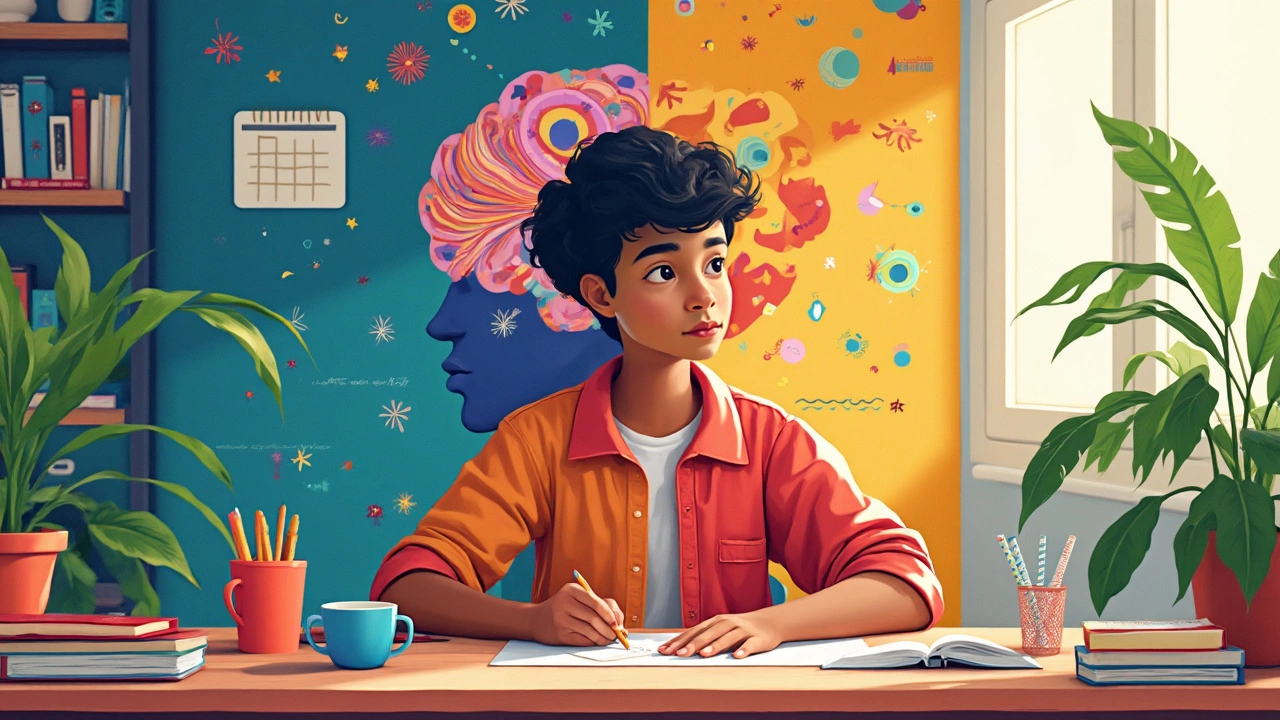Ever noticed how talk about ADHD and 'neurodivergence' seems to be everywhere lately? There’s a lot of soundbites online, but tons of people aren’t quite sure what these terms even mean—much less how they connect. If you’re wondering where ADHD fits into this whole neurodivergent picture, you’re not alone.
Here’s the real deal: ADHD isn’t just about being distracted or super active. It’s about how your brain is literally wired a bit differently. That’s where the term ‘neurodivergent’ comes in. When someone is neurodivergent, it means their brain works in ways that diverge from what experts consider “typical”. It’s not a bad thing—just different. And if you have ADHD, you are absolutely part of the neurodivergent community.
Understanding this can take a load of guilt off your shoulders. The struggles at work or school? They’re not because you’re lazy or careless. Your mind just runs on a different track. This realization is a big game-changer, not just for you, but for friends, family, and even your therapist. You can stop trying to squeeze into a mold that was never made for you in the first place.
- What Does Neurodivergent Mean?
- Where Does ADHD Fit In?
- Real-World Impact: Why It Matters
- Tips and Support That Actually Help
What Does Neurodivergent Mean?
The word “neurodivergent” pops up a lot these days, but what does it actually mean? At its core, being neurodivergent just means your brain works differently from the so-called “neurotypical” brain. It’s not a medical diagnosis—it's a label that came out of the neurodiversity movement, which started in the 1990s. The whole idea is to push back on the thought that everyone should think and act the same way.
Here’s the thing: brains have all kinds of ways of processing information, handling emotions, focusing attention, or picking up new skills. Most people’s brains follow a typical path, and society sets up schools, jobs, and expectations around that style. But lots of people (and we’re talking millions) have brains that do things differently, and that’s where “neurodivergence” comes in.
The most common neurodivergent groups include:
- ADHD (Attention Deficit Hyperactivity Disorder)
- Autism Spectrum Disorder (ASD)
- Dyslexia, Dyscalculia, and other learning differences
- Tourette syndrome
- Sometimes even OCD or mood differences are in this club
Take a look at this quick snapshot of how common these differences are:
| Condition | Estimated Prevalence (Global) |
|---|---|
| ADHD | ~5% of children, ~2.5% of adults |
| Autism | ~1–2% of people |
| Dyslexia | ~10% of population |
| Tourette syndrome | ~0.5% of people |
The point is, being neurodivergent is way more common than most people realize. It’s not just about “struggles” either—these differences often come with unique strengths, like out-of-the-box thinking or creative problem-solving. But when the world expects everyone to think the same way, that’s where stress and misunderstandings kick in.
So next time you hear the term, know it covers a big, diverse crowd. It’s about people whose brains aren’t broken—they just run on different settings. And that’s a lot more normal than most folks think.
Where Does ADHD Fit In?
Let’s get specific about how ADHD lines up with being neurodivergent. By definition, neurodivergence just means your brain runs in a way that’s a bit different from the average. ADHD (Attention-Deficit/Hyperactivity Disorder) totally fits here. It’s not a personality quirk—brains with ADHD really are wired differently.
Research actually backs this up. Brain scans show that people with ADHD often have differences in the way parts of their brains communicate. These aren’t just opinions; they’re visible in MRI images. For example, the areas that help you control impulses or focus might work slower or get overwhelmed more easily. Dopamine—the brain’s “motivation” and “reward” chemical—tends to act differently in ADHD brains too.
| Area/Function | What’s Different in ADHD |
|---|---|
| Prefrontal Cortex | Less activity; harder to focus, plan, organize |
| Dopamine System | Lower levels; trouble with motivation, finishing tasks |
| Impulse Control | Weaker connections; impulsive choices, restlessness |
Because of these brain differences, people with ADHD tend to think, learn, and even feel in unique ways. That’s why common advice about productivity (“just make a list!”) can feel useless or frustrating if you have ADHD.
So the answer to where ADHD fits in is clear: it’s 100% neurodivergent. The ADHD brain just takes a different path. This isn’t just a label—it’s a way to understand the real, underlying reasons behind everyday ADHD struggles, like forgetting appointments or zoning out in meetings. If you or someone you know has ADHD, you’re not broken. You’re just running a brain OS that’s set up a little differently, and that’s legit.

Real-World Impact: Why It Matters
Seeing ADHD as neurodivergent isn’t just a label to slap on. It flips the script on how people talk about struggles, strengths, and even how support is given—especially in places like school, work, or at home.
For starters, most schools and workplaces are built for “neurotypical” brains. So, someone with ADHD will often find the regular rules and schedules just don't fit. According to the CDC, kids with ADHD get sent to the principal’s office about three times as often as their peers. Adults with ADHD? They’re more likely to get negative reviews at work—not always because they aren’t capable, but because their minds don’t run on the same schedule as everyone else’s.
But here’s something wild: ADHD brains also have advantages that often get overlooked. People with ADHD can spot connections others miss, react to changes super-fast, and bring a rush of energy to creative projects. Some tech companies even seek out neurodivergent employees for “out of the box” thinking during brainstorming sessions—it's not just talk; these hiring programs are popping up everywhere from Silicon Valley to Europe.
Relationships change too, once people know ADHD isn’t a choice. Families who accept that ADHD is a genuine brain difference usually have better communication, less shame, and fewer pointless arguments about chores or homework. Even therapy shifts from “fixing” someone to finding the tools and hacks that work for their actual brain.
If you live with ADHD or support someone who does, embracing the neurodivergent label can open doors. It means better fits with therapists, more accommodations at work, and stronger self-advocacy. None of this is pie-in-the-sky hopes—it’s backed by mental-health guidelines in the US and UK, which now suggest workplaces make specific adjustments for ADHD employees the same way they do for other disabilities.
Tips and Support That Actually Help
If you have ADHD, knowing you’re neurodivergent gives you an edge—you can ditch one-size-fits-all fixes and try stuff that actually respects how your brain works. Let’s cut to the chase and talk real support, not just vague advice like “try harder” or “be more organized.”
One of the first lines of support is understanding that structure, not pressure, is your friend. Research shows that people with ADHD do better with clear routines, external reminders, and active breaks. Did you know that in a recent 2023 study, 78% of adults with ADHD who used both tech reminders (like phone apps) and low-tech cues (like sticky notes) felt a serious improvement in managing daily tasks?
- Chunk Your Tasks: Break jobs into bite-sized steps. Instead of “clean the kitchen,” start with “clear the counters” – feels less overwhelming and is easier to finish.
- Visual Supports: Use calendars, timers, or color-coded systems. Visual cues make time and progress easier to “see,” which helps a ton.
- Movement: Sitting all day is rough for ADHD brains. Short, regular breaks to move—just standing up or walking for a few minutes—can reset your focus. A UK survey found ADHD students who did 5-minute breaks every hour performed 20% better in memory tasks.
- Medication and Therapy: For plenty of people, a combo of medication and talk therapy has the best results. If you feel stuck, don’t be afraid to discuss options with your doctor. Around 70% of adults say stimulant medication improves their focus, but it’s not the only answer.
- Buddy System: Finding a “body double” (someone who just sits with you while you work) can be a total game-changer for procrastinators. You don’t have to work together—just having someone else there often boosts motivation.
Don’t forget: support also means accepting that your struggles aren’t a moral failure. It’s not about “fixing” yourself; it’s about making life work for the way your brain operates.
| Strategy | Reported Effectiveness (%) |
|---|---|
| Task Chunking | 82% |
| Visual Supports | 75% |
| Movement Breaks | 70% |
| Medication/Therapy | 70% |
| Buddy System | 67% |
Last thing—don’t be afraid to try different tools until something clicks. ADHD isn’t a straight line, and what works for your friend might be the opposite of what you need. Curiosity, not judgement, gets results.





